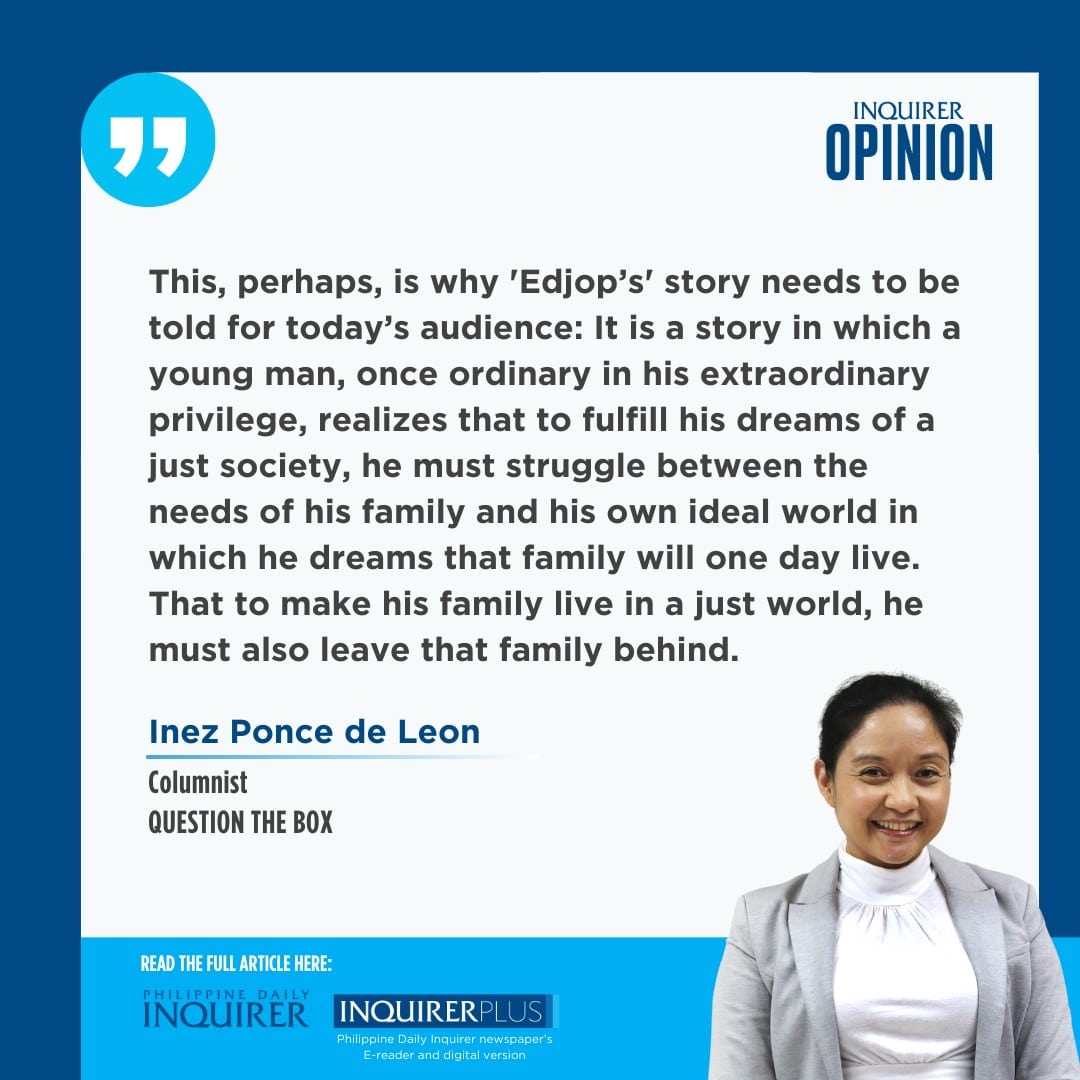A story that must be told
In high school English literature class, our teacher always talked about storytelling and centering it on a significant human experience.
For years, those of us who became writers would, in one way or another, wrestle with the meaning of “significant.” Was a good story something that everyone had gone through and knew well, or did a good story have to be unique, so that our job as writers was to unearth the nuances of every life we were tasked to document?
Article continues after this advertisementA few weeks ago, I watched an offline screening of “Edjop,” thanks to an invitation by my fellow Inquirer columnist Eleanor Pinugu. An offline screening is meant to screen a near-complete film: missing scenes are marked by cards to help the audience imagine what the footage will show, and some technical aspects are still tentative pending changes post-production.
In the case of EDJOP, the screening was for the producers to complete raising the target budget for the film so that it will be suitable for wide release. The movie does feel incomplete; but the story is there, begging to be told, wanting a few more breaths to see it to completion.
“Edjop” tells the true story of Edgar Jopson, activist and martial law victim, who began as a privileged young man raised in a well-to-do family before he became Public Enemy No. 1 of the Marcos regime.
Article continues after this advertisementJopson was educated at the Ateneo from elementary all the way through to college, had a family who listened to his questions and speculations on society as a young boy, was socialized to be a man for others. He had the luxury of great hopes, and he wanted change in a country swiftly being overtaken by the powerful who cared nothing for the poor, the hungry, the destitute.
“Edjop” also tells the story of Joyette, Jopson’s daughter, who grew up with stories of her father, and who strives to find her own identity even as she sees the country her father fought for slowly falling into ruin. The film weaves narratives of privilege, growth, of bearing the violence perpetuated by a state that refuses to listen.
For indeed, that is what kills Edgar Jopson: a state that sees his closeness to the poor as a mark of the enemy, and a state that sees its own people as an enemy that must be silenced into submission. It is the same state that kills our spirits today, that wants to bury dissent and history beneath the comfort of forgetting.
There, too, is a touch of the ordinary in “Edjop’s” story, off-screen. A colleague at my department remembered him as the enigmatic student leader who went from room to room in Ateneo high school, inviting students to fight back, to speak up, to go out and join the protest—at Gate 3, not too many steps away from the school grounds, at what was then a cornfield that fronted tree-lined Katipunan Avenue.
Jopson began as that kind of fighter: picking the low-hanging fruit, afraid to break out of the comforts of home and school; but finally finding courage, and recognizing that freedom without justice is an illusion. It is the beginning of the truest brand of empowerment, where one realizes how we have fashioned our own cages of privilege, comfort, and fear, and are merely performing to a waiting crowd in the zoo of life.
The crowd might be those in power who throw us a few coins for their self-assurance of “charity,” who demand all our labor for a mere pittance, who fling scraps of entertainment to amuse us for a few days. To break out, many try to perform harder; and yet they can never escape, because they cling to their comforts and fears for so long until they are too old, too tired, too jaded to fight.
This, perhaps, is why “Edjop’s” story needs to be told for today’s audience: It is a story in which a young man, once ordinary in his extraordinary privilege, realizes that to fulfill his dreams of a just society, he must struggle between the needs of his family and his own ideal world in which he dreams that family will one day live.
That to make his family live in a just world, he must also leave that family behind.
It is the same daily struggle, where those barely living on minimum wage brave weather, traffic, and broken immune systems because they dream of a better life for their children. To some extent, it is the struggle of those too afraid to go beyond their online likes and shares, who do not know how to fight, but know that they must.
As I look back on both the screening and my high school lessons, I realize that the real challenge of storytellers is not finding significance in a story, but in articulating its humanity—in talking about our mixture of frailty and strength, of our imperfect lives filled with questions that might never be answered, of our uncertain futures where our dreams might never be fulfilled.
Yet we must keep telling these stories.
And we, too, must keep fighting for these stories to be told.
—————-
iponcedeleon@ateneo.edu

















